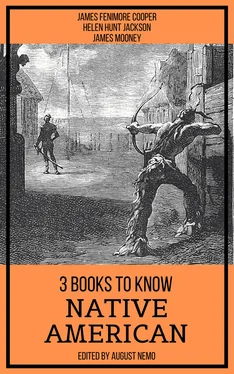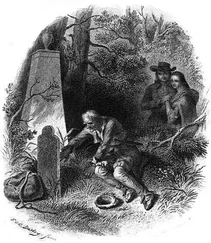“I call them Iroquois, because to me every native, who speaks a foreign tongue, is accounted an enemy, though he may pretend to serve the king! If Webb wants faith and honesty in an Indian, let him bring out the tribes of the Delawares, and send these greedy and lying Mohawks and Oneidas, with their six nations of varlets, where in nature they belong, among the French!”
“We should then exchange a warlike for a useless friend! I have heard that the Delawares have laid aside the hatchet, and are content to be called women!”
“Ay, shame on the Hollanders 10 and Iroquois, who circumvented them by their deviltries, into such a treaty! But I have known them for twenty years, and I call him liar, that says cowardly blood runs in the veins of a Delaware. You have driven their tribes from the sea-shore, and would now believe what their enemies say, that you may sleep at night upon an easy pillow. No, no; to me, every Indian who speaks a foreign tongue is an Iroquois, whether the castle 11 of his tribe be in Canada, or be in New York.”
10 The reader will remember that New York was originally a colony of the Dutch.
11 The principal villages of the Indians are still called “castles” by the whites of New York. “Oneida castle” is no more than a scattered hamlet; but the name is in general use.
Heyward, perceiving that the stubborn adherence of the scout to the cause of his friends the Delawares or Mohicans, for they were branches of the same numerous people, was likely to prolong a useless discussion, changed the subject.
“Treaty or no treaty, I know full well, that your two companions are brave and cautious warriors! have they heard or seen anything of our enemies?”
“An Indian is a mortal to be felt afore he is seen,” returned the scout, ascending the rock, and throwing the deer carelessly down. “I trust to other signs than such as come in at the eye, when I am outlying on the trail of the Mingos.”
“Do your ears tell you that they have traced our retreat?”
“I should be sorry to think they had, though this is a spot that stout courage might hold for a smart skrimmage. I will not deny, however, but the horses cowered when I passed them, as though they scented the wolves; and a wolf is a beast that is apt to hover about an Indian ambushment, craving the offals of the deer the savages kill.”
“You forget the buck at your feet! or, may we not owe their visit to the dead colt? Ha! what noise is that?”
“Poor Miriam!” murmured the stranger; “thy foal was foreordained to become a prey to ravenous beasts!” Then, suddenly lifting up his voice, amid the eternal din of the waters, he sang aloud —
“First born of Egypt, smite did He,
Of mankind, and of beast also;
O, Egypt! wonders sent ‘midst thee,
On Pharaoh and his servants too!”
“The death of the colt sits heavy on the heart of its owner,” said the scout; “but it’s a good sign to see a man account upon his dumb friends. He has the religion of the matter, in believing what is to happen will happen; and with such a consolation, it won’t be long afore he submits to the rationality of killing a four-footed beast, to save the lives of human men. It may be as you say,” he continued, reverting to the purport of Heyward’s last remark; “and the greater the reason why we should cut our steaks, and let the carcase drive down the stream, or we shall have the pack howling along the cliffs, begrudging every mouthful we swallow. Besides, though the Delaware tongue is the same as a book to the Iroquois, the cunning varlets are quick enough at understanding the reason of a wolf’s howl.”
The scout, whilst making his remarks, was busied in collecting certain necessary implements; as he concluded, he moved silently by the group of travellers, accompanied by the Mohicans, who seemed to comprehend his intentions with instinctive readiness, when the whole three disappeared in succession, seeming to vanish against the dark face of a perpendicular rock, that rose to the height of a few yards within as many feet of the water’s edge.
––––––––

“Those strains that once did sweet in Zion glide;
He wales a portion with judicious care;
And ‘Let us worship God,’ he says, with solemn air.”
Burns.
––––––––

Heyward, and his female companions, witnessed this mysterious movement with secret uneasiness; for, though the conduct of the white man had hitherto been above reproach, his rude equipments, blunt address, and strong antipathies, together with the character of his silent associates, were all causes for exciting distrust in minds that had been so recently alarmed by Indian treachery.
The stranger alone disregarded the passing incidents. He seated himself on a projection of the rocks, whence he gave no other signs of consciousness than by the struggles of his spirit, as manifested in frequent and heavy sighs. Smothered voices were next heard, as though men called to each other in the bowels of the earth, when a sudden light flashed upon those without, and laid bare the much-prized secret of the place.
At the farther extremity of a narrow, deep cavern in the rock, whose length appeared much extended by the perspective and the nature of the light by which it was seen, was seated the scout, holding a blazing knot of pine. The strong glare of the fire fell full upon his sturdy, weather-beaten countenance and forest attire, lending an air of romantic wildness to the aspect of an individual, who, seen by the sober light of day, would have exhibited the peculiarities of a man remarkable for the strangeness of his dress, the iron-like inflexibility of his frame, and the singular compound of quick, vigilant sagacity, and of exquisite simplicity, that by turns usurped the possession of his muscular features. At a little distance in advance stood Uncas, his whole person thrown powerfully into view. The travellers anxiously regarded the upright, flexible figure of the young Mohican, graceful and unrestrained in the attitudes and movements of nature. Though his person was more than usually screened by a green and fringed hunting-shirt, like that of the white man, there was no concealment to his dark, glancing, fearless eye, alike terrible and calm; the bold outline of his high, haughty features, pure in their native red; or to the dignified elevation of his receding forehead, together with all the finest proportions of a noble head, bared to the generous scalping tuft. It was the first opportunity possessed by Duncan and his companions, to view the marked lineaments of either of their Indian attendants, and each individual of the party felt relieved from a burden of doubt, as the proud and determined, though wild expression of the features of the young warrior forced itself on their notice. They felt it might be a being partially benighted in the vale of ignorance, but it could not be one who would willingly devote his rich natural gifts to the purposes of wanton treachery. The ingenuous Alice gazed at his free air and proud carriage, as she would have looked upon some precious relic of the Grecian chisel, to which life had been imparted by the intervention of a miracle; while Heyward, though accustomed to see the perfection of form which abounds among the uncorrupted natives, openly expressed his admiration at such an unblemished specimen of the noblest proportions of man.
“I could sleep in peace,” whispered Alice, in reply, “with such a fearless and generous looking youth for my sentinel. Surely, Duncan, those cruel murders, those terrific scenes of torture, of which we read and hear so much, are never acted in the presence of such as he!”
Читать дальше













